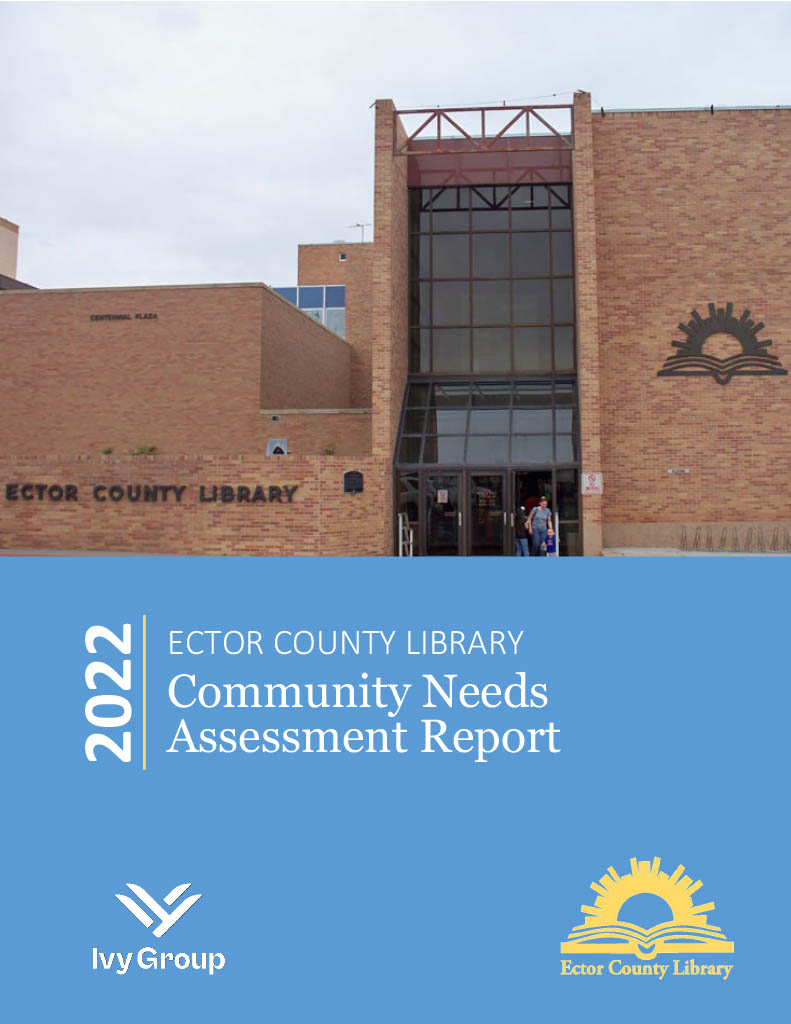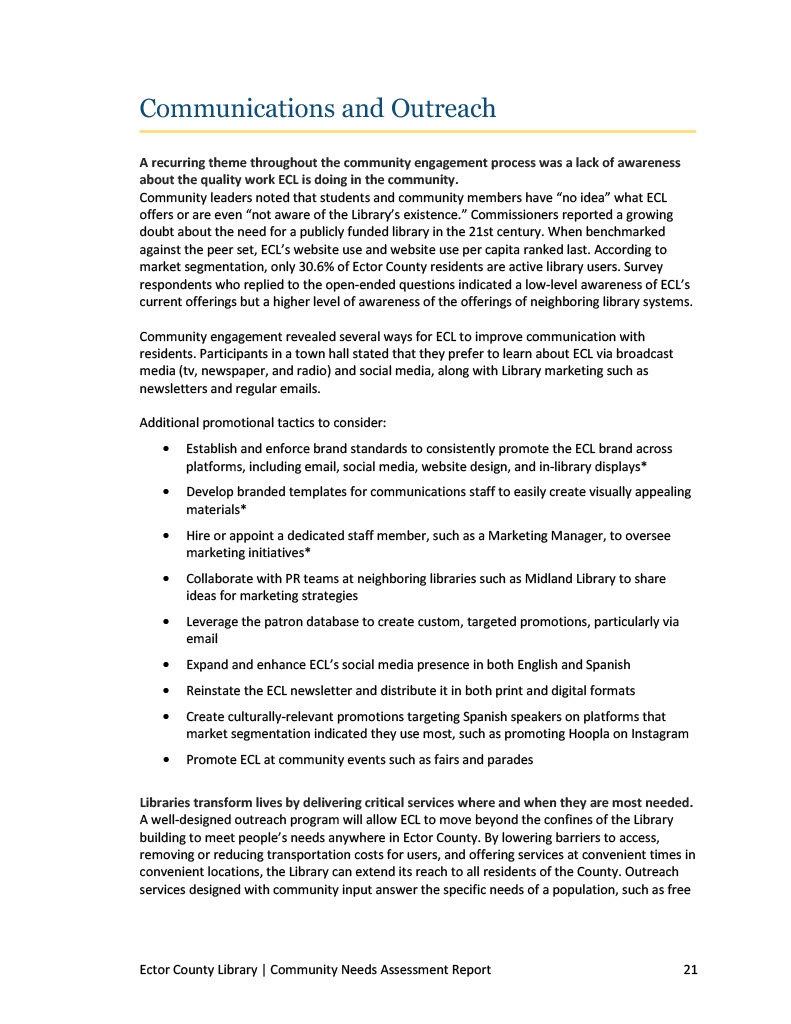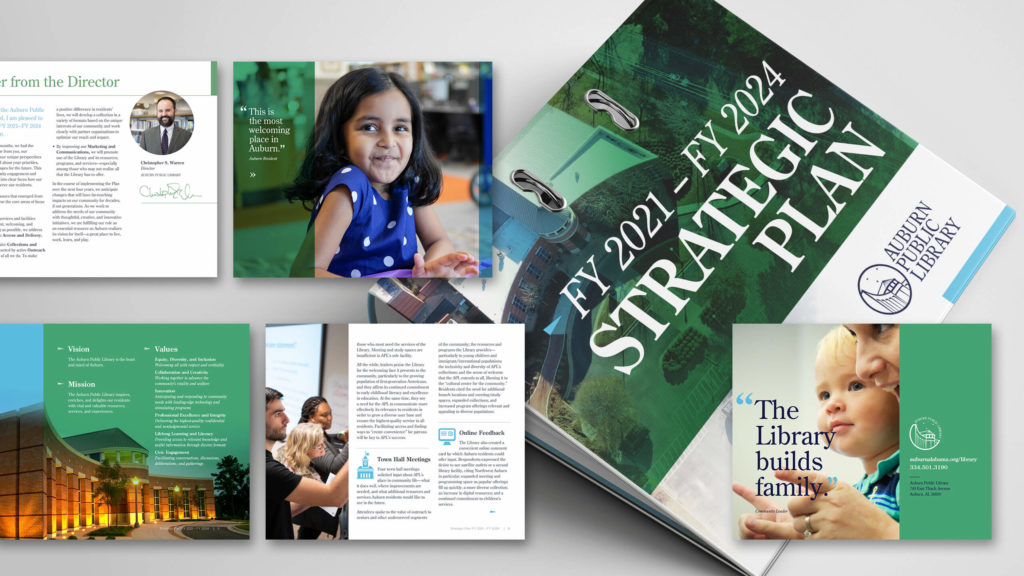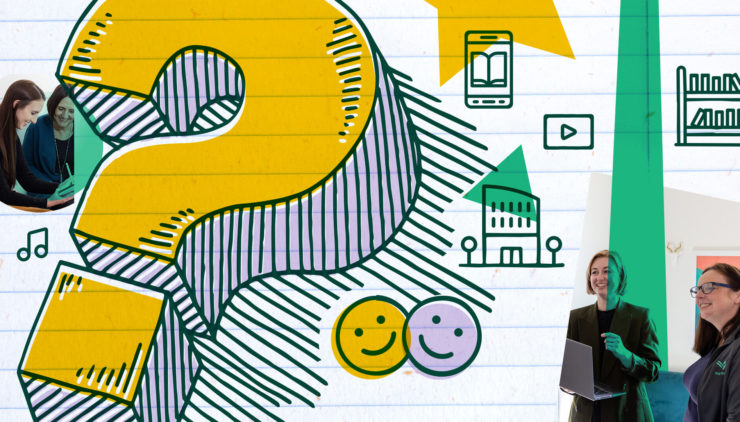The Right Questions
You've decided to hire a consultant for your library's strategic plan. You know a library consultant can provide:
- An outside perspective—for recognizing opportunities and navigating internal relationships
- Research expertise—to uncover and interpret the most important data
- Community engagement skills—to bring the community together in strengthening and supporting the library
- Project management—to coordinate engagements and deliver the final report on time
But how do you choose among multiple applicants? How do you identify the right strategic planning consultant for your project?
Library staff know that asking the right questions in reference interviews with patrons can save everyone time and frustration—and lead to the best results. When you ask the right questions, your interviews with prospective library consultants can do the same.
Staff Questions
How much staff involvement should we expect?
Do the consultant’s expectations match your capacity and intentions? Use this question to find out the levels of staff involvement on offer and if there's flexibility to align with your situation.
At The Ivy Group, we’ve worked with libraries across the country of all sizes and legal bases, from multi-jurisdictional systems and district libraries to those with one building and one full-time staff member. We know from experience that staff engagement is always essential for a successful planning process. It needs, though, to be thoughtfully tailored to the Library's capacity, which is why we offer a variety of staff engagement options from online surveys to full- and half-day workshops
The size and nature of your strategic planning committee helps determine how much involvement you want it to have in the planning process. If you're short on time or staff, you'll want the consultant to do the bulk of the plan writing, on top of the research and management.
Even in this case, be sure your library consultant incorporates staff work groups into the development of the final report. This ensures that the tactics supporting your goals are feasible and appropriate to local needs.
Who will lead the process?
Usually, you're hiring a library consultant to take up most of the project management. If you're looking to co-lead the process or set up a specific division of responsibilities, discuss that up front.
And if the consultant is expecting you to do most of the management, now's the time to find that out!
How will you build internal consensus around the project?
This is where you really explore the consultant's expertise and comfort. Press for specific methodologies. Ideally, they'll have no trouble explaining their methods for engaging staff, as well as for planning and facilitating workshop and drafting sessions.
When a library has many new staff members, as Northville District Library did at the start of our partnership with them, there’s even greater potential for internal development and benefit.
Community Questions
How will the community be involved?
While demographic, financial, and market segmentation data are critical components of planning, there's no substitute for human feedback. All community-based research should include interviews with leading figures to determine local priorities, plus direct community engagement (through surveys, town halls, and/or focus groups) to throw the doors open and hear from all interested residents.
Is affordable housing residents' most pressing concern? Is health care unavailable? Are transportation issues impacting Library use? By casting a wide net, from elected officials to school district leaders to lapsed users, we invite multiple viewpoints to create the best basis for developing priorities and initiatives. (This also allows the planning process to serve the secondary purpose of building support for the Library.)
Even if your budget limits your options, you need a library consultant who is fully capable of carrying out the essential kinds of community research. They should also be qualified to advise you at the start of the process regarding which kinds of engagement to prioritize in the case of funding limitations.
How will you engage underserved communities and non-users?
Every library wants to expand its user base and better serve its community. Every library also struggles to reach the populations who currently make little or no use of its services.
When you ask this question, you're probing how the consultant will specifically target hard-to-reach groups and coax out their needs and opinions.
For instance, at Ivy we work with local agencies and leaders to bring engagements into the community. We frequently hold focus groups and discussions at community centers, employ translation services, and go virtual when needed.
What is your firm’s DEI background?
Is the consultant committed to engaging diverse and underserved parts of your community? Well, great! This question lets you find out if they have the expertise to fulfill that commitment.
Ivy's staff and team of consultants, for instance, have backgrounds in mediation and facilitation and have led DEI committees within library systems.
See how Ector County Library engaged its community and built consensus.
Deliverable Questions
What will the deliverables look like?
It's one thing to dream big. It's another to take concrete steps toward a dream. The library consultant should tell you what you'll be getting, in terms of reports, research, and updates—along with when you'll be getting them. You can probe for more specific details with questions like, "Will you provide interim research reports?"
While the final plan is the ultimate goal, there ought to be several other concrete deliverables in the consultant's proposal.
Will the final plan be formatted or designed?



As the two examples above show, a formatted plan looks a bit simpler. A designed plan creates more visual appeal to engage readers, which can be important for a public-facing document.
Whichever option is right for your library, you want to clarify this choice at the start. You don't want to pay for something without realizing it or receive a plan missing the visual impact you expected.
Will there be actionable tactics?
Each of the areas of focus in our plans are divided into strategies with supporting tactics. We then work together with Library insiders to identify the resources (staffing, funding, equipment) needed to bring the vision to life.
Use this question to find out whether your consultant does the same.
How will we measure success?
You want a consultant who's thinking beyond delivery of the final plan. They should be crafting each detail with the long-term perspective of your staff's work over the coming years.
Once a final plan is approved, Ivy creates a dynamic dashboard. The dashboard lays out staff responsibilities, resources, and timelines for each tactic. This is an eminently useful internal tool, and it can also be used in meetings with boards, funding agencies, and donors to demonstrate progress and accountability.
Will your prospective consultant be providing a similar way of measuring success toward your objectives?
Take a look at the sample dashboard at the bottom of our blog Do You Need a Consultant for your Library Strategic Plan?
Process Questions
How long will the process take?
We don't have to tell you that the timeline's length matters. You might have upcoming deadlines—an important vote, a reporting deadline, a time-limited opportunity to make important decisions about spaces / facilities. You certainly have a limit to how long you want to be pulling staff effort and attention away from the Library's day-to-day operations and other priorities.
Of course, even if you already have a general estimate, you'll need to know how the consultant plans to meet it.
What is your management process, and how do you keep on schedule?
Some consultants might use agile timelines, which focus on immediate, short-term deadlines. These offer greater flexibility but require higher staff interaction to meet those numerous smaller deadlines. They also don't determine an outcome at the start of the process.
On the other hand, the waterfall method, which Ivy uses, offers a standardized timeline and establishes its goal at the outset. As experienced project managers, we work with our clients to set a high-level goal at the start of a project and scaffold a timeline to meet the end date, which is often driven by state requirements.
In order to incorporate stakeholder input and accommodate inevitable minor delays, we remain flexible within that framework while still bringing the overall project in on time.
Think ahead about how you and your staff will prefer to work. Keep that in mind while you listen to the answers here.
Consultant Questions
What sets your firm apart?
Hopefully, your RFP asks for sample projects as well as references. Firms give you the most concrete evidence of their leadership and capabilities through the results of their past projects.
If any of the following weren't covered in the responses to your RFP—or you just want to delve deeper—try these questions.
Who will be working on the project and in what capacity?
You should feel that you're in good hands. Find out about the consultants' subject matter expertise by requesting short biographies of those who will be working on your project.
Ideally, the individual team members, as well as the organization as a whole, will have plenty of experience with strategic planning and with libraries like yours.
Will you provide one point of contact?
At Ivy, we always give clients a single main point of contact. The person you speak to in interviews at the very start of the process is the same person who will be your point of contact throughout planning. This makes for a direct, dependable relationship and clear communication.
Check if this is the case for the library consultant you're considering. If your initial contact is going to hand you off to someone else, maybe you'd like the chance to talk to that person before signing on.
Are there additional travel and vendor fees? If there are unforeseen costs, who will pay?
Budgets are important, and no one likes a surprise invoice. At Ivy, we detail vendor fees and estimated travel costs upfront. Our flat-fee structure is easy to present to library boards and other stakeholders.
If any fees aren’t included upfront for the consultant you're considering, get clarity about them now in the interviews. (Or just run the other way!)
An ounce of preparation…
You commit serious time and money when you hire a library consultant. By thinking about your ultimate outcome and preparing a list of relevant questions, you can confidently select a firm that meets your standards and goals.
That, in turn, will open up the widest spectrum of promising possibilities for your library's future.
Category: Libraries
Tags: libraries, strategic plans, strategy
